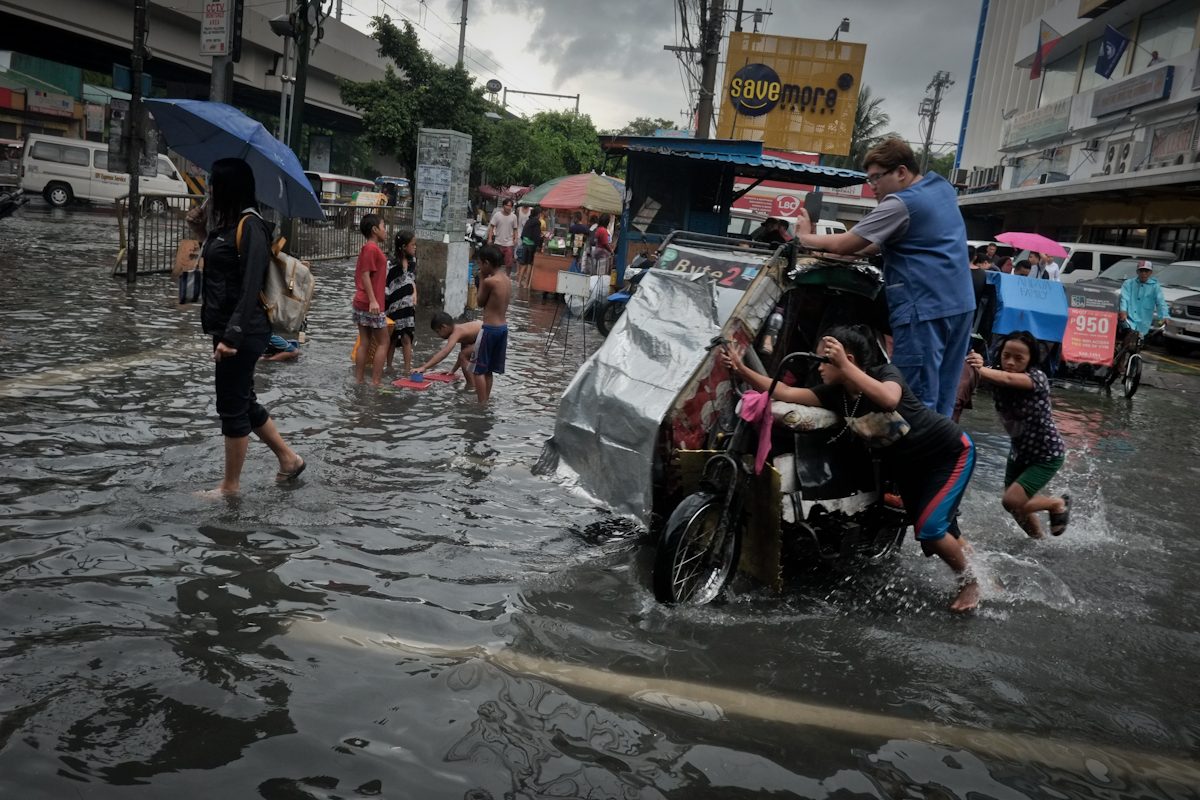SUMMARY
This is AI generated summarization, which may have errors. For context, always refer to the full article.

MANILA, Philippines – National Economic and Development Authority (NEDA) chief Arsenio Balisacan clarified on Wednesday, November 4, that the P350-billion ($7.49 billion) Flood Control Masterplan for Metro Manila and surrounding areas is still subject to “further refinement” and evaluation.
Balisacan issued the clarification on Wednesday, November 4, after a University of the Philippines professor alleged that the plan is “flawed” – a point that raised “important concerns” on the part of NEDA, its chief admitted.
“Notwithstanding the kind of rigor we exercise during program and project deliberations, we acknowledge that there is always room for improvement. In this respect, we welcome inputs particularly from the scientific community, to ensure that our infrastructure program is truly sound and serves the interest of the country and the Filipino people over the long term,” Balisacan said.
In an article in the Philippine Daily Inquirer on November 1, UP professor Carlo A. Arcilla, director of the National Institute of Geological Sciences in UP-Diliman, expressed concern about “the quality of the topographic data used in the modeling and planning” of the NEDA Board-approved master plan, and the design of the proposed dam for the flood control program under the plan.
Balisacan said that NEDA will “look more closely” into the details cited by Arcilla regarding the master plan, which also involves upgrading pumping stations, unclogging drains, and clearing waterways of informal settlers.
“We would like to assure the public that we in NEDA remain committed to safeguarding the integrity of the evaluation processes of development programs and projects and that we will continue to work with and learn from various stakeholders in improving our processes,” he added.
Basis for approval
In his 5-point clarification, Balisacan explained that the master plan was developed and subsequently approved by the NEDA Board “based on data and information available at the time of evaluation.”
He said the Department of Public Works and Highways (DPWH) initiated the master plan in 2011 as a holistic means to address flood risks in Metro Manila and its vicinity.
He explained that the master plan, initially developed by consultants through official development assistance, was reviewed by DPWH flood management experts. It was later subjected to review and discussion by the NEDA Infrastructure Committee (INFRACOM), tasked to oversee the country’s infrastructure development plans and policies.
The master plan reflected inputs from international and local flood management experts, before being presented to, and later on approved by, the NEDA Board on September 4, 2012, Balisacan said.
Further evaluation, refinements
The NEDA chief stressed that the master plan “provides policy directions and guides the development of specific projects, each of which will have to go through separate evaluation processes.”
“The flood management masterplan serves as a general blueprint for flood management programs and projects in Metro Manila and its vicinity. As a holistic plan, it provides policy directions and guides the design for a set of specific flood management projects,” Balisacan said.
He said that the master plan consists of several programs and projects that may be considered for implementation until 2035. but “each of these specific components and projects under the master plan…will have to go through rounds of review and evaluation at different levels.”
Balisacan added that “components of the master plan are subject to further refinements.”
“Costs and components in the master plan are indicative and are subject to adjustments, both major and minor, depending on new information that may become available in the process,” he said.
Balisacan noted that at the time that the master plan was being developed in 2011, data from Project Noah (National Operational Assessment Hazards) of the Department of Science and Technology were not yet available. Project Noah was launched on July 6, 2012.
“Nonetheless, during the INFRACOM deliberations, DPWH Secretary Rogelio Singson said that some of the principles of the Project Noah would be adopted. It was understood that in the conduct of feasibility studies for the components of the masterplan, other available studies and information would also be considered,” Balisacan said.
Multi-disciplinary evaluation, appraisal
He also said that the individual projects stemming out from the master plan are subject to the Investment Coordination Committee (ICC) multi-disciplinary evaluation and appraisal process, prior to deliberation by the NEDA Board.
“Any proposed project with a budget of P1 billion ($21.37 million) and above will have to undergo a rigorous evaluation process to determine feasibility, cost-effectiveness, and overall economic and social benefits,” Balisacan said.
The NEDA chief further explained that a specific project proposal prepared by consultants will first be reviewed by the proponent agency. He said once reviewed and approved by the proponent agency, it will then be submitted to the ICC’s Technical Board, consisting of experts in different disciplines, for initial review.
“If deemed ready, it is then endorsed to the ICC’s Cabinet Committee. During the review and appraisal by both bodies, a project is evaluated based on 6 detailed analyses: technical, financial, economic, environmental, institutional, and social impacts,” Balisacan said.
“In this process, all assumptions are challenged and potential issues are discussed. Only when a project is deemed sound will it be endorsed to the NEDA Board chaired by the President for another round of deliberation or approval,” he added.
With regard to financing, the NEDA chief said funding of projects are not automatically done through loans, “especially now that there is greater fiscal space and we have public-private partnership options.”
Under the ICC Financing Framework, the Department of Finance determines the source of financing for major development projects, he added. – Rappler.com
$1 = P46.76
Add a comment
How does this make you feel?
There are no comments yet. Add your comment to start the conversation.